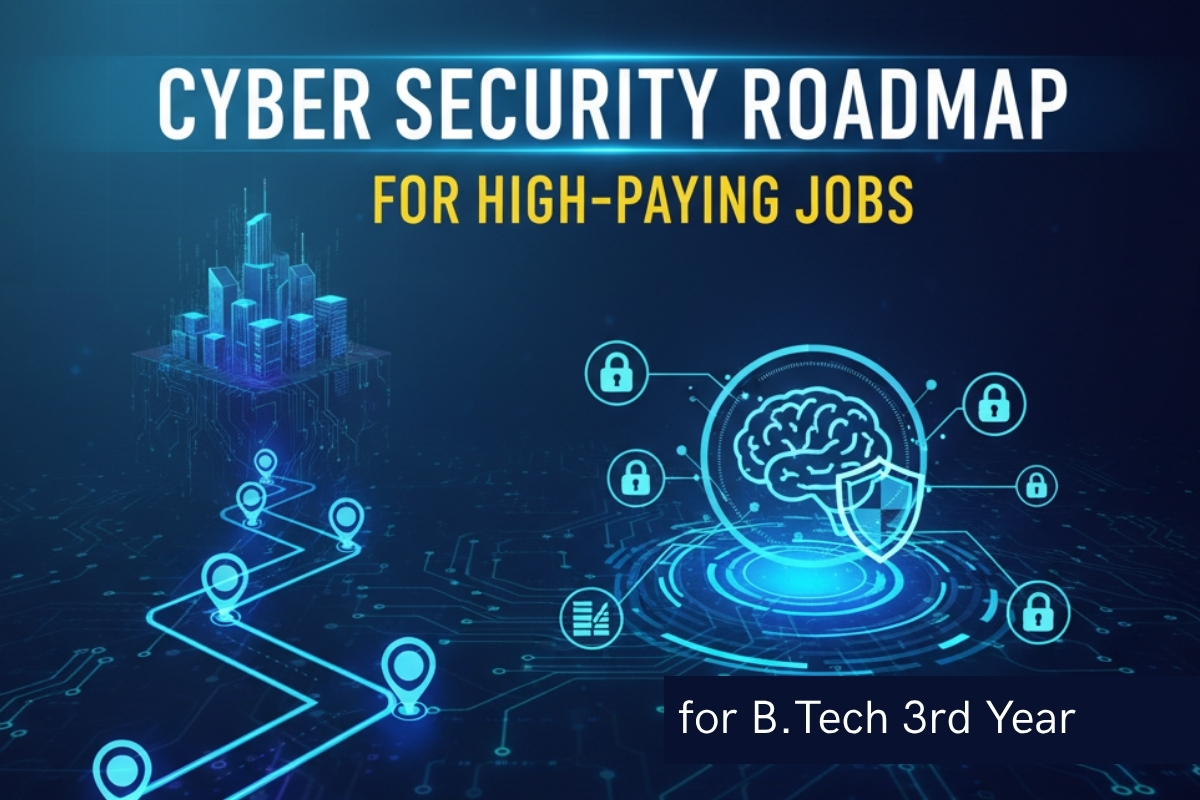In the third year of engineering, most students start to think seriously about life beyond college. It is no more about completing semesters but building a career path that looks exciting and safe. In this changing digital era, cybersecurity has emerged as one of the most future-ready and high-paying domains for young engineers. It isn’t just another IT trend but the defense system that keeps the digital world up and running. For students who desire to get an early lead, joining a cyber security course in jaipur is a strong decision during this crucial academic juncture.
In most parts of the world, when organizations turn data-driven, the need for professionals who will be able to secure information has never been more vital than now. Professionals in cybersecurity, therefore, lead this transformation in present times by keeping the systems resilient against cyber-attacks. This is the time when B.Tech 3rd-year students can start their journey toward becoming one of these digital defenders-with the right roadmap.
Why Cybersecurity Is the Smartest Career Choice for Engineers
Cybersecurity sits at the intersection of technology, strategy and ethics. It is about thinking like an innovator but also like a hacker who can imagine not only how systems can be built but also how they can be broken. For such reasons, due to both the technical foundation and analytical skills, engineers are the best fit for this domain.
Digitization of every industry has turned cybersecurity into an all-pervasive need. E-commerce, fintech, healthcare and defense-all require competent cybersecurity professionals who can ward off security breaches, safely protect networks and meet security protocol requirements. This may be the beauty of this field: it calls forth specialists in programming, networking, machine learning, system architecture and all other related fields under the larger mission of digital protection.
While cyber threats have reached unparalleled levels of sophistication, the industry faces an unprecedented deficit in talent. Millions of cybersecurity jobs will go unfilled for years to come, experts say-a prospect opening up extraordinary opportunities for quick-acting qualified graduates.
Laying the Foundation: The Technical Backbone
Every great cybersecurity expert starts with a good foundation. Before mastering advanced security tools, students should first understand how technology itself really works: networks, operating systems, and databases form the core of any security infrastructure. Being aware of how data travels, where vulnerabilities emerge, and how systems interact provides the background and context within which every security challenge will fall.
This is the right time for a third-year student to combine academics with practical exposure. Small projects, coding exercises, or open-source security challenges help in building critical thinking and problem-solving skills. Online enrollment in cybersecurity courses could accelerate that growth even further by providing structured guidance, simulations of real-world exposure, and access to experienced mentors.
Learning Tools and Certifications That Build Credibility
Once the basics have been laid, familiarity with the tools defining modern cybersecurity means becoming familiar with applications like Wireshark, Nmap, Burp Suite, and Metasploit-essential applications in the domain of ethical hacking, vulnerability testing, and penetration analysis. Understanding how these platforms work lets students simulate cyber threats and design stronger defense systems.
In parallel, certifications act as a validation of skills. Earning cyber security certifications online such as CEH (Certified Ethical Hacker), CompTIA Security+, or CISCO’s CyberOps Associate boosts credibility in the eyes of recruiters. For students, these certifications serve as both learning milestones and professional assets, bridging the gap between theoretical knowledge and employability.
The Importance of Practical Experience
While theory forms a basis for understanding, practice develops expertise. Cybersecurity is that field which learns most by trying. Participating in cybersecurity internships allows students to experience real-world challenges, from handling live security incidents to performing vulnerability assessments.
Virtual internship programs or online internship programs provide flexibility for those balancing academics with training, while a free online internship with a certificate adds credibility to resumes. On the other hand, direct mentorship and teamwork exposure are provided through an offline internship in local IT firms or research labs. Each of these formats has something valuable to impart, and the key is to keep learning through practice.
These experiences not only strengthen technical confidence but also reveal in what area of cybersecurity one is truly excited: ethical hacking, network security, forensics, or governance. Early exposure helps shape direction long before graduation.
Integrating Emerging Technologies: The AI Connection
With the development of cybersecurity, its relation to AI becomes highly relevant. In fact, most modern-day security systems are dependent on AI algorithms for predicting threats, detecting anomalies, and acting accordingly in an automated manner. To students, this convergence means one thing: combining these skills translates to premium career opportunities.
The Artificial Intelligence course in Jaipur, when done along with cybersecurity training, will help students in the way how automation and analytics are used in discovering potential threats. Organizations do need people who can explain the insights that are coming from AI and translate them into strong security policies. Merging AI with cybersecurity makes a future-proof skillset, commanding attention in job markets globally.
Beyond Technical Knowledge: The Human Side of Cybersecurity
The best in cybersecurity understand not just machines, but people. The discipline calls for precision and patience, just like communication. It’s about articulating intricate security concepts to non-technical teams, working under pressure, and calmly thinking through high-stakes incidents.
The students should be actively engaged in skill development related to analytical reasoning, problem-solving, and teamwork. Most of the edtech companies these days focus on upskilling and corporate training as an inherent part of cybersecurity education. These programs help in grooming technically competent students into professionals who can lead projects and communicate effectively in dynamic work environments.
Building a Career Roadmap That Works
Very few cybersecurity successes happen by accident; they are a result of well-planned strategy coupled with continuous growth. The third-year engineering students need to identify their areas of interest first in cybersecurity. Does your interest lie in network defense, ethical hacking, or cloud security? Once you identify your niche, tailor your projects, internships, and certifications around it.
Create a professional online presence: make a LinkedIn profile, mentioning your certifications, projects, and contributions to any security forums. Sharing your insights, writing posts about what you learn, or contributing to open-source communities may bring in recruiters and build credibility early on.
Networking also plays a huge role. Attend cybersecurity seminars, hackathons, and online communities. The more you engage, the more opportunities that will come your way.
Also Read: Top Skills in Demand in 2025 and How Pedestal EdTech Can Prepare You
Careers in Cybersecurity: An Increasingly Broad Field
The purview of cybersecurity is much wider than one may construe. Instead, jobs in security analysis, penetration testing, cloud security engineering, and incident responding are just the tip of the iceberg. New roles such as cyber threat intelligence analyst, data privacy consultant, and digital forensic investigator are beginning to emerge with the increasing rise of AI, IoT, and blockchain.
It is an industry that offers complete job security along with global mobility. Skills related to cybersecurity are valued worldwide, and this is one of those few fields where possibilities are not constrained by geographical boundaries. For students of B. Tech, investment in time to now build such capabilities ensures professional freedom with financial stability in the long run.
Conclusion :
Pedestal EdTech serves as a transformational agent in helping students of engineering align their learning to the career outcomes that await them in the real world. Hands-on courses, mentorship programs, and practical internships create pathways for students at Pedestal to become industry-ready even before graduation. A perfect blend of technical excellence with guided career direction secures it as a trusted partner in every learner’s journey.
For the B.Tech 3rd-year students, cybersecurity is not just a career option but an opportunity to become the guardian of the digital future. The roadmap is pretty clear: it gives ample importance to building a strong foundation, embracing continuous learning, and ensuring maximum practical exposure. With proper guidance, determination, and training, your journey from campus to a high-paying cybersecurity career can begin today.




I love how this post highlights the strategic and ethical aspects of cybersecurity. It’s not just about tech skills, but also thinking like a hacker to anticipate vulnerabilities, which is such an important mindset for future professionals.